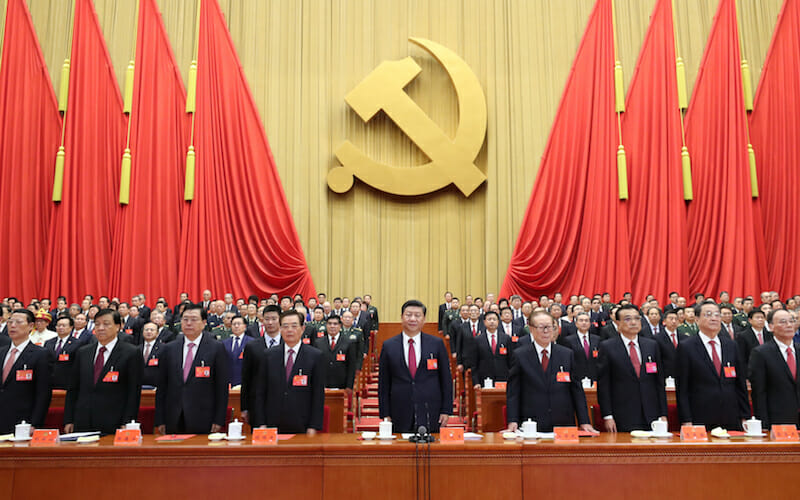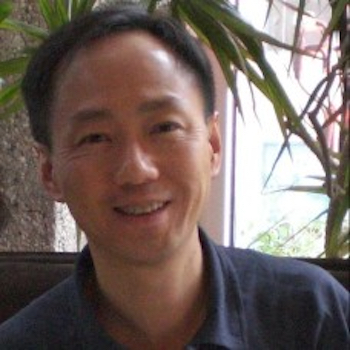
China’s Rotational Power Succession Keeps on Rolling
The institutionalization of the rotational elitist power succession in China which began in the 1990s, is demonstrated in the new composition of the 7-member Politburo Standing Committee (PSC) after the end of the 19th Chinese Communist Party (CCP) Congress.
Xi Jinping (aged 64) and Li Keqiang (62) will serve their second terms as President and Premier respectively. The five new PSC members are: Li Zhanshu (67, started as a prefecture government clerk, Hebei Normal University graduate through part-time night school studies), Wang Yang (62, laborer at county food factory, Central Party School (CPS) bachelor degree in public admin), Wang Huning (62, studied French in Shanghai and then international politics at Fudan University, nickname ‘China’s Kissinger’), Zhao Leji (60, studied philosophy at Peking University and politics at CPS), and Han Zheng ( 63, warehouse worker, East China Normal University graduate on part-time basis).
The two governing rules for ‘rotational power’ are straightforward. The ‘Age Limit’ stipulates that for anyone to enter into a new term, this person must be 67 or younger. The rumor that Xi’s close ally, Wang Qishan (aged 69), would continue to stay at PSC does not make sense.
The ‘two-term limit’ states that no one can serve more than two five-year terms in one particular governmental position (the only exception so far is Zhou Xiaochun as People’s Bank of China Governor), but this limit does not apply to Party positions. The latest composition appears that, assuming the Age Limit effective as usual, the three youngest new members (Wang, Wang and Zhao) can serve two terms at most whereas the other two are one term only, thus “no obvious successors” as questioned by some critics.
One possibility for this is that the institutionalization process may move on to incorporate the two-term limit into the PSC membership as we should not forget that in June 1989, Jiang Zemin was admitted into the PSC and ‘elected’ as the party’s General Secretary simultaneously without going through the ‘apprenticeship’ like Hu Jintao and Xi Jinping. With Jiang as the precedent case, the successors can take up the top position immediately after joining the PSC. The two leading candidates Hu Chunhua (54) and Chen Min’er (57) who are generally expected to take over from President Xi and Premier Li in 2022 are serving in Politburo, merely a step away from the PSC.
The three institutions for ‘succession’ are also simple. ‘Open recruitment’ remains intact through which all Chinese citizens are eligible to apply for a CCP membership to have their personal ambitions fulfilled, and the 2,000-year long traditional preference for university graduates will prevail. Special attention must be paid to the fact that all the newly selected helmsmen are not the so-called princelings, thus negating the rumors over the past 10 years that China would be ruled by the scions.
The ‘Dual Hierarchy Ladders’ norm is also firmly in place to provide two paths for upward mobility, either as a ‘specialist’ — banker, diplomat, engineer and the like, climbing along the technical ladder up to the Minister level, or as a ‘politician’ with an ‘ideologically socialist mindset’ striving to be promoted by accumulating a wide spectrum of administrative expertise in local governments or various public agencies with the possibility of becoming the state’s president ultimately. The ‘Central Party School’ is the third institution that cultivates leadership qualities for all cadres in general and evaluates the credentials of anyone who might be considered to be groomed as a high-flyer. Of course, the final mile to the top depends on many other non-institutional factors and personal qualities ranging from relationships with the incumbent leaders to self-discipline.
The matrix of all these rules and institutions is the foundation for the legitimacy of the CCP’s one-party rule as millions of Chinese citizens somehow know certain basics of Western democracy through studying abroad or touring overseas. A recent Wall Street Journal video clip which explains why Chinese students abroad don’t return home with ideas of Western democracy echoes a Foreign Policy 2015 survey of Chinese students in the U.S. “the lion’s share of respondents expressed cautious approval for an official rejection of Western ideology. Most admitted to a general admiration for Western thought but said they believed such ideas were simply inappropriate for China.” The major reason behind this, in my view, is that China has its own rotational meritocracy which I call the Helmsman Ruler System.
Over the past five years during Xi’s first term as the CCP General Secretary (and President of the state), two new developments for this mechanism were notable according to Brookings Institution’s research. One is the emergence of think tanks as a new ‘revolving door’ for elite recruitment. It means that the graduates of both domestic and foreign universities (such as Wang Huning) who spend most of their career time in research institutes without practical administrative experience may also get promoted along with those through the traditional channels of Youth League (such as Wang Yang), local governments, state-owned enterprises and grassroots organizations. Another is the consolidation of the belief that “hardship experience makes better leaders.” Many newly selected ‘sixth generation’ leaders were either government officials serving in the inland west of China or ‘sent-down youth’ working at collective farms in remote areas in the 1960s (Li Zhanshu, Zhao Leji, Han Zheng).
The ‘progress as usual’ institutionalization has at least two implications to multi-polar world politics.
Firstly, the rotational nature of power succession, considered to be a form of (collective) meritocracy by the majority of citizens, effectively enables one-party rule to claim legitimacy through which Beijing can gain trust from many developing countries that China is a reliable and capable player in the world arena. China’s formation of the ‘16+1’ collaboration with sixteen countries of Central-Eastern Europe has been regarded as a breakthrough in this respect.
Secondly, the persistency and consistency of both domestic and foreign policies run by Beijing have steadily enabled China to become a stabilizer for promoting world peace as well as resetting the world order. All the three leaders — Jiang Zemin (1989-2002), Hu Jintao (2002-12) and Xi (2012- ) — resolutely maintained the non-interference policy and the peaceful rise doctrine passed on by Deng Xiaoping (even in the case of North Korea, China does not stop Pyongyang from building up their own nuclear capacity). The market liberation since Jiang, taxation reform since Zhu Rongji (Premier 1998-2003), developments of green energy and the Silk Road project since Hu, agricultural transformation and pollution controls since Wen Jiabao (Premier 2003-2013), to name a few, have all evolved step by step in accordance with the consecutive Five Year Plans one after another. The two most remarkable achievements so far are China’s endorsement of the Paris Climate Accord 2015, and deeper integration into international society (as advocated by Hedley Bull) via ‘16+1,’ BRICS, Belt and Road Initiative…
In the wake of the unpredictable swing between Left and Right in Western countries in recent decades, China has the potential to reset the world order with new norms and rules, or in Rex Tillerson’s words, “undermining the (current) international rules-based order.”

